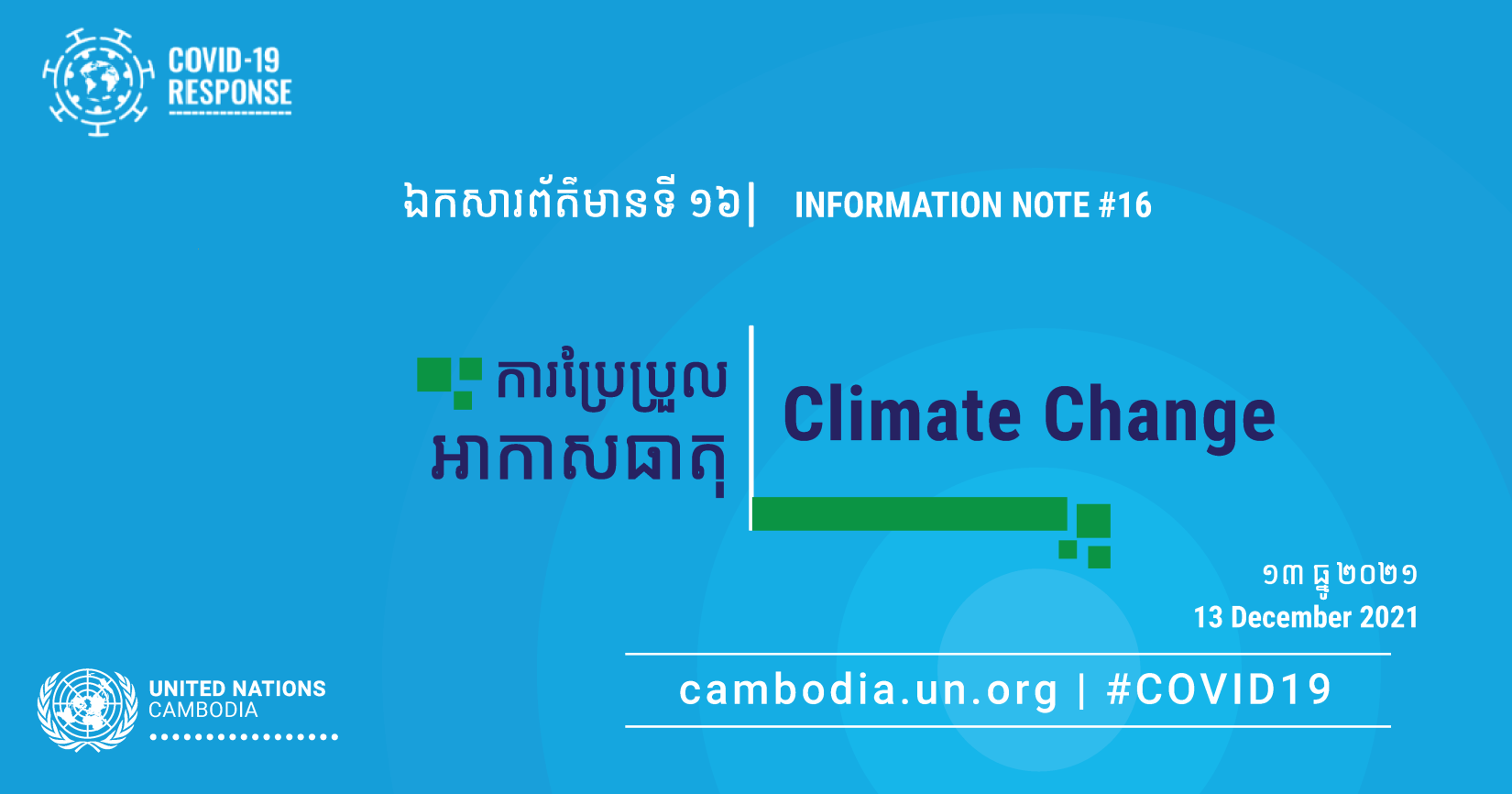Information Note #16: Climate Change
13 December 2021

As the world gathered at the global climate conference COP26 seeking solutions to the climate crisis, we reflect on the need for action in Cambodia.
Over the last decades, Cambodia has had significant success in poverty alleviation and socio-economic development. However, increasing pressures on Cambodia’s ecosystems linked to climate change and complex environmental challenge – including cross-border ones linked to the Mekong River – need to be considered in its development model if Cambodia is to achieve the Sustainable Development Goals (SDGs).
The Ministry of Economy and Finance and the National Council for Sustainable Development estimate that climate change impacts could reduce Cambodia’s expected GDP by almost 10% by 2050, even if temperature increase is kept within the 2°C target. Cambodia ranks amongst the countries most vulnerable to climate change as a large proportion of its population depends on agriculture for livelihoods and lives in flood-prone areas[1]. Rainfall patterns are changing and are becoming less predictable, leading to more and more severe extreme weather events, such as tropical storms, floods and droughts.
This will significantly impact communities and may further result in economic losses, indebtedness, increased inequality, food insecurity and loss of life, with agriculture, infrastructure, forestry, and human health, the most affected sectors. The most vulnerable - children, women, people with disabilities, the elderly, and socially marginalized groups, such as migrant communities - will be the most affected.
Now is the time for a paradigm shift to support socio-economic growth that minimizes environmental and climate change impacts, with focus on the most vulnerable. The UN is encouraged by the growing interest in Cambodia and commitment across Government, civil society, private sector and young people, to place sustainable land and natural resource management and green growth at the heart of the country’s socio-economic development.
The United Nations in Cambodia is supporting the Royal Government of Cambodia to achieve Sustainable Development Goal 13 ‘Climate Action’ and take urgent action to combat climate change and its impacts. It is catalyzing its efforts around 4 broad areas:
- Improved Governance and Policy. The UN has enhanced institutional capacities and coordination at national and sub-national level, providing technical support to among others the National Council for Sustainable Development on tools for effective mainstreaming of climate change into policies, regulatory frameworks, programmes and budgets. As a result, there is a more conducive and coordinated enabling environment for climate change governance. The UN supported Cambodia’s updated Nationally Determined Contribution submitted in 2020 and is currently assisting with the development of its Long-Term Strategy for Carbon Neutrality. The UN has been assisting the Ministry of Mines and Energy and Ministry of Economy and Finance for renewable energy and energy efficiency policies contributing to climate change mitigation and achievement of Cambodia’s goal of universal electrification with reliable and affordable electricity supply leaving no one behind. These lay the foundations for a greener recovery and seize the opportunity of the pandemic disruptions for building forward better. The UN also supported 26 national food system dialogues with civil society and youth, ahead of the Food System Summit, to find solutions aimed at having more resilient and inclusive food systems as an integral part of climate action.
- Enhanced systems and capacities to build resilience to climate-related hazards. Due to higher levels of uncertainty and emergence of new, often more intense, climate-related hazards, the UN has supported an integrated risk management approach to allow Cambodia to better prepare for and reduce risks linked to climate change and extreme weather. For example, 219,000 people in disaster-affected areas received warning messages during major floods in 2020 and 2021 through the early warning system EWS1294 which was rolled out and activated nationwide. An adaptation of this system to provide more accurate warnings in urban areas is currently being piloted with UN support. In support of national efforts, the Humanitarian Response Forum, co-led by UN agencies together with civil society organizations, ensures well-coordinated preparedness and response actions to climate-related hazards. The UN has improved resilience through supporting shock responsive social protection and non -food items, benefitting 170,000 vulnerable people affected by floods, including the prison population and internal displaced people in evacuation sites, in 2020 and 2021. In addition, education, building technical capacity and ensuring community participation have contributed to scale-up community resilience, and in the areas of WASH and education the UN is providing technical support for climate risks informed programming to strengthen the resilience of these sectors.
- Interventions that integrate environmental conservation with the promotion of sustainable economic activities. UN is working with communities and sub-national authorities to translate policy into practice, providing tools, skills and new opportunities for vulnerable groups, specifically women, to enhance their livelihoods, while also promoting the sustainable use natural resources. Conservation of nature is important in addressing climate change and building resilient societies and communities. Through targeted, pilot interventions in four provinces, smallholder farmers have been introduced to new techniques for growing crops, restoring land and managing water resources for better production and higher profitability while enhancing climate change adaptation capacities. Women producer and saving groups have been formed, empowering their position in local communities. In 2020, 500 hectares of land located in economic land concessions and managed by companies have been returned to indigenous communities, including sacred forests, spirit forests, cemeteries and reserve land. In 2021, over 2,600 households have benefitted from sustainable financing mechanisms for forest protection and climate-smart economic activities in 24,000 hectares of community forests and fisheries, and 15,500 hectares of protected areas.
- Innovative financing. The UN is supporting the Government to foster and attract innovative financing solutions and instruments that act as leverage to build and sustain climate-resilient local-communities, their economies and livelihoods. Data and analysis on external and domestic public financing for climate change is produced by the Government every year with UN support. The UN is currently analyzing feasibility of green bonds as part of the SDG Financing Strategy, and evaluating blended financing mechanisms for WASH, water pipe and solid waste management. The UN is supporting the Government in establish a conducive regulatory framework to attract high quality carbon credits, including for the forestry sector under REDD+. Together with the Government, the UN is facilitating the engagement of the private sector in tackling climate change through advocacy, building awareness, dialogues, and developing standards and platforms for fostering shared values and commitments. The UN is launching a new Public Private Partnership initiative in country, together with other development partners. The original total project cost is estimated to US$1.5 million.
The UN Human Rights Council recognised this October, for the first time, that having a clean, healthy and sustainable environment is a human right. This serves as a springboard to push for transformative economic, social and environmental policies that will protect people and nature. To achieve transformational efforts towards a more climate-smart, sustainable, economic development model, adaptation and mitigation strategies need to be interlinked and contextualized and target and engage the most vulnerable groups, including children.
The focus on a green economy at the global level, with climate neutrality commitments by countries and corporations, provides opportunities for Cambodia to attract investments in green technologies, with great potential to boost economic growth and create new jobs. Making Cambodia’s economy and society more resilient to climate shocks is thus an urgent priority. This requires a mix of approaches including enabling regulatory measures, engineering and scientific solutions, innovative financing, risk management tools, social and business innovations, and youth engagement. The UN is equipped to support Cambodia in developing these integrated approaches to address climate impacts, particularly for the most vulnerable, and support all Cambodian’s right to a healthy environment.
###
UN Cambodia’s Response to COVID-19 Information Notes are official documents from the United Nations in Cambodia intended for the media and other partners. They are consolidated by the Office of the UN Resident Coordinator on behalf of the UN Country Team.
[1] UNICEF global report on children climate risk index ranking Cambodia as #46 globally



